
The collection and sharing of online information becomes chaotic. This is why people use WordPress to create encyclopedias or knowledge bases: websites have special organizational tools that allow multiple users to archive, display, and navigate content effectively. There are many reasons why the
wiki encyclopedia is useful, whether it’s brand maintenance and sharing of users’ documentation, or creating a website area to detail product information.
they are also ideal for employee training resources or for building a crowdsourced knowledge base for your product, whether it’s movies, software, or video games. Fortunately for
, anyone can create an WordPress encyclopedia site to better organize content and provide users with collaboration options.
continues to read to understand the components of the encyclopedia website, and then learn more about how to set up.
- what is the WordPress encyclopedia website (or knowledge base)? How does
- create encyclopedia
- 10 best WordPress encyclopedia and knowledge base topics
- 10 best WordPress encyclopedia and knowledge base plug-in
what is the WordPress encyclopedia website (or knowledge base)? The
wiki encyclopedia is a collection of content (media, documents, tutorials) organized in a searchable database for easy navigation.
many wiki encyclopedias offer collaborative features and even community contribution options (such as how Baidu encyclopedia, Wikipedia or Fandom thrive in terms of user submission and editing), but you can also create an encyclopedia that is closed to contributions, where the moderator creates content and simply publishes it for viewing.
Encyclopedia works well with knowledge bases and customer support documents when you remove collaboration capabilities. The
WordPress encyclopedia is more specific. WordPress encyclopedias are the same as any other encyclopedia, except that they run on the WordPress content management system (CMS).
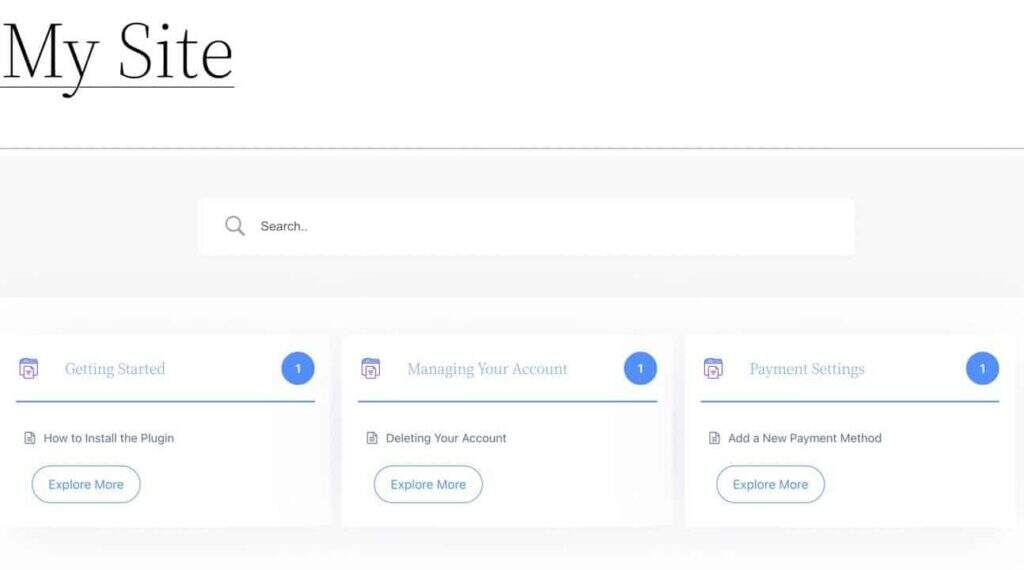
Encyclopedia / knowledge Base sample Encyclopedia / knowledge Base run on WordPress benefits of
WordPress Encyclopedia
does your business or organization need WordPress encyclopedia? This problem usually occurs when you are looking for a better way to organize content and present it to users or internal employees.
you may find that your blog has become so big that it is difficult to find certain topics. Or maybe you have a series of Google documents that need to be organized on centralized Web pages with search capabilities.
whatever the reason, you will often find that WordPress encyclopedia is the perfect solution to online chaos.
the following are the main advantages of WordPress encyclopedia:
- All the information is stored in one place: the encyclopedia has improved its internal system of e-mail, local documents, online documents and databases. They also help integrate fragmented content that you share with users, such as blog posts, web pages, or online documents stored in different locations. In short, the encyclopedia allows you to centralize each piece of content in a centralized location.
- Users and stakeholders become more knowledgeable: easily accessible knowledge makes confident, well-informed customer support representatives who need to provide customers with quick answers more confident. It can also give customers a deeper understanding of your product, encourage them to use it more, ask questions, and drive you to improve.
- Information is easier to find: customers and employees use documents to find solutions about the product, but databases, online storage systems, and even blogs become disorganized. The encyclopedia allows users to search with keywords, use filters, and find linked content through clickable navigation.
- Content is easier to maintain: all you need to access an encyclopedia is an Internet connection, an Internet browser, and an encyclopedia’s URL. No special software, passwords, or knowledge of accessing and navigating databases or software are required.
- Built-in quick links: the cornerstone of any encyclopedia is the ability to link one content to another. Most wiki systems allow users to create quick links to another existing content, usually using shortcuts or hotkeys.
- You can crowdsource: encyclopedias usually have the ability to let users control content creation. This is not necessary if you want a more closed system, but many encyclopedias are based entirely on the voluntary work of users (such as Baidu encyclopedia, Wikipedia or Fandom).
- Take advantage of advanced organizational elements such as categories and tags: we have mentioned filters and search bars, but with encyclopedia, you can also use tags and categories to control your documents. This is especially important when the content is not suitable for an area of the encyclopedia or if you want to add more sections for filtering.
- Revision control is simple and intuitive: most word processors have some kind of revision control, but they are complex, with too many crossed-out words and comments. On the other hand, encyclopedias tend to provide built-in revision control, recording each document version for switching and comparison, which makes revisions easier to manage than in word processors.
- Encyclopedia is cheap: WordPress encyclopedia in particular. You only need a WordPress theme or plug-in to implement an encyclopedia on your existing website. WordPress is already free, while encyclopedic themes / plug-ins cost no more than $100 (that is, if you can’t find what you like for free).
Which websites use WordPress encyclopedia? The
WordPress encyclopedia supports the knowledge base on the entire Internet. To let you know how popular they are, here are some famous brands that use WordPress encyclopedia:
Resource Center

Resource Center
Resource Center presents content for the WordPress Academy knowledge base, website announcements, explanatory documents, FAQ help Center, and blogs. The
WordPress Academy is the true WordPress encyclopedia because it has a classified column that contains tutorial links to everything from WordPress basics to WordPress development. The
IEEE 802.1 working Group
IEEE 802.1 working Group Wikipedia
IEEE 802.1 working Group website is a powerful encyclopedia that contains maintenance, security, and networking articles on the 802 LAN/MAN architecture. The
encyclopedia home page has two sidebars for navigation, important (getting started) articles for beginners, a search bar, and various other links to categories, tags, and recent articles.
Fandom 
Fandom website
Fandom– creates the most popular platform for encyclopedias about TV shows, games and movies-running most of its blogs and encyclopedia interfaces through WordPress. Fandom shows the real power behind the WordPress encyclopedia because it provides user-generated content tools and powerful content creation elements for links between media, text, formats, and articles. The
WordPress Codex
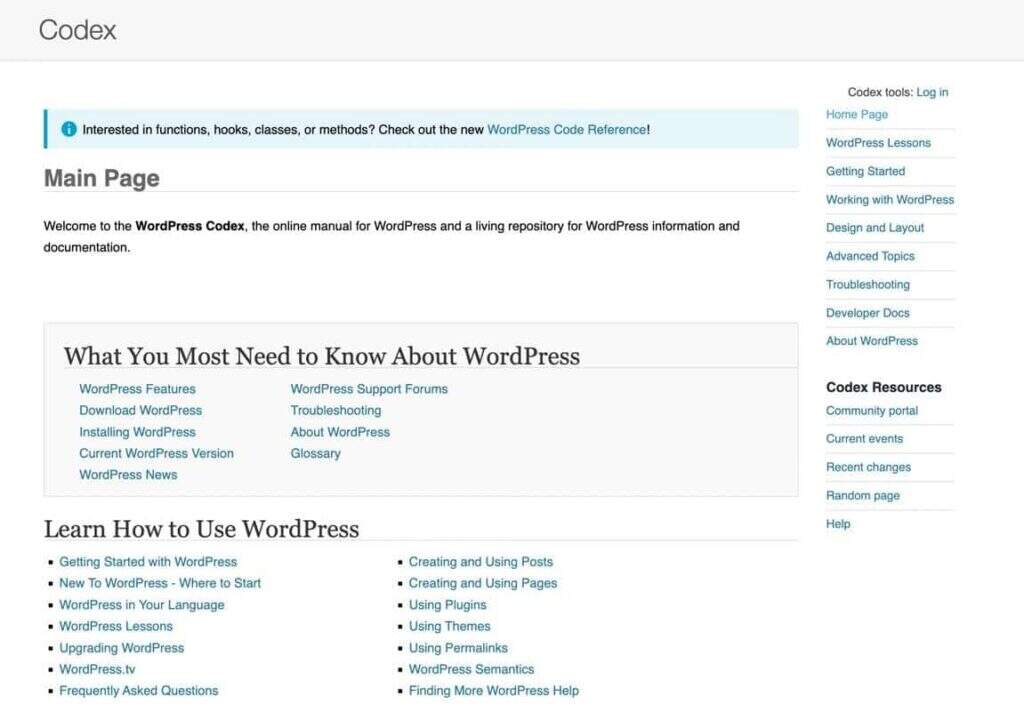
WordPress Codex encyclopedia
WordPress Codex page makes sense to use WordPress for its encyclopedia. However, this is still a good example of how technology companies compile all Codex resources into an online area.
for example, the WordPress Codex encyclopedia contains links to articles about writing plug-ins, using subtopics, and contributing to WordPress, all of which are available to WordPress novice and advanced users.
Pet Wiki

Pet Wiki
Pet Wiki functions more like a traditional encyclopedia than a knowledge base. The site is a hub for pet lovers with navigation menus and links to articles on rodents, reptiles, dogs, exotic animals, birds and cats.
for many modern encyclopedias, the home page looks more like a blog, but one might argue that support for images and rich designs makes blogs and encyclopedias similar in the first place.
The Tangent Bundle

The Tangent Bundle
Tangent Bundle uses WordPress to build an encyclopedia to support a large number of family, health, game and lifestyle articles. Everything from categories to sidebar categories makes it a beautiful and simple blog with encyclopedic elements.
North Carolina Internal knowledge Base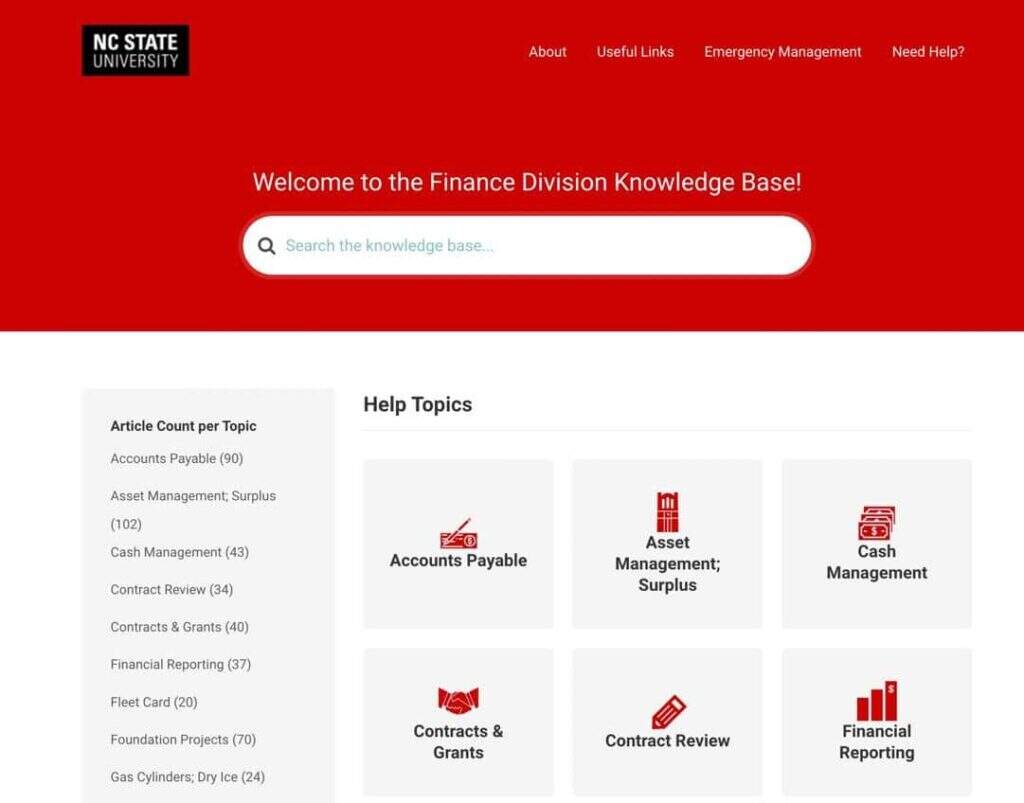
North Carolina Financial Secretary knowledge Base
many schools and related organizations rely on the power of the WordPress encyclopedia plug-in to create internal and external knowledge base pages.
for example, North Carolina State University has established multiple knowledge bases for students and faculty to access important information, such as the finance department encyclopedia linked to accounts payable, contracts, and cash management topics.
WP Simple Pay 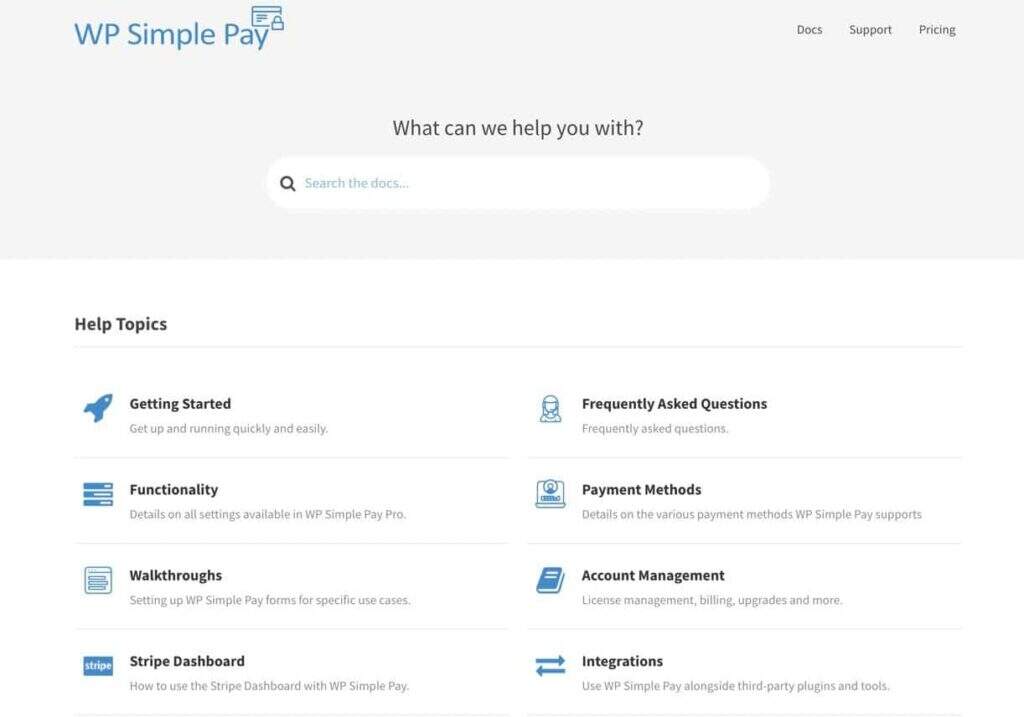
WP Simple Pay knowledge Base
WP Simple Pay is WordPress’s Stripe payment plug-in, which is very similar to other software and plug-in business and needs to tell its customers how to use the product. So what could be easier than going through the WordPress knowledge base? The
WP Simple Pay knowledge Base contains links to icons for getting started guides, FAQs, walkthroughs, and account management tutorials.
once you move over the home page, the categories are displayed in the sidebar for easy access, and each article provides countless media elements, links, interactive buttons, and so on. The main element of the
WordPress encyclopedia
is not the same as the encyclopedia, but there are some basic elements that make the encyclopedia different from the regular website. These additional features give the encyclopedia an advantage over web pages, local databases, e-mail systems, and online storage services (such as those discussed earlier). When
builds your WordPress encyclopedia site– whether using themes or plug-ins– look for these main elements to ensure that you create the best encyclopedia:
- A powerful organizational system with a clear hierarchy, menus, labels, themes, categories and breadcrumbs.
- A home page (home page) that highlights hot or important topics, such as large buttons for beginner articles or specific category titles, all merged on the first page. A search bar used by
- to instantly enter keywords and find relevant content.
- An internal link that allows users to quickly jump from one content to another. It is also important for encyclopedia to have quick link tools at the back end.
- ‘s back-end (and possibly front-end) standard content creation tool, similar to a blog editor, with the ability to add text, images, videos, links, and headlines.
- Collaborative editing tools for users to correct, edit, and add content. Sometimes this is closed to a small group of moderators or only one administrator.
- Log in to the system or user authentication module, whether used to add content to a public encyclopedia, log in to a private encyclopedia, or access additional features on the encyclopedia.
- is an interactive and communication tool for users to comment on content, take notes and collaborate. (optional) what does
need to create a WordPress encyclopedia website
an WordPress encyclopedia website consists of three parts:
- WordPress website: download and install free WordPress CMS on your host, or consider activating WordPress directly from your host.
- WordPress hosting: with its lightning-fast CDN, WordPress hosting and affordable hosting programs for small and high-traffic encyclopedia sites, encyclopedia sites are easy to build.
- Encyclopedia theme or plug-in: check out your options below.
How to create an encyclopedia on WordPress
you can start an encyclopedia or knowledge base using one of the following options:
- An WordPress encyclopedia type theme: if you have no questions to replace the current theme or start a new site.
- A WordPress encyclopedia plug-in: used to add wiki functionality without changing the current website design.
in this tutorial, we will continue to show you how to create an WordPress encyclopedia site using a specific plug-in. However, later in the article, we listed 10 WordPress encyclopedia themes, 10 WordPress encyclopedia plug-ins, and custom code to launch the encyclopedia website; so you can choose what works best for you. Step 1 of
: installing the BetterDocs plug-in
BetterDocs is our first choice for building an WordPress encyclopedia or knowledge base, because it is modern in design, powerful, and a plug-in, which means you don’t have to replace the current topic. Not to mention, if you want to upgrade, BetterDocs has a free version and advanced features. With it in
, install and activate the BetterDocs plug-in to begin. The

BetterDocs plug-in
step 2: enabling the built-in documentation page
BetterDocs provides a great startup guide to set up your encyclopedia in a few minutes. Step through these steps, but make sure you stop at the Setup Pages tab.
here, you will select the Enable Built-in Documentation Page check box.
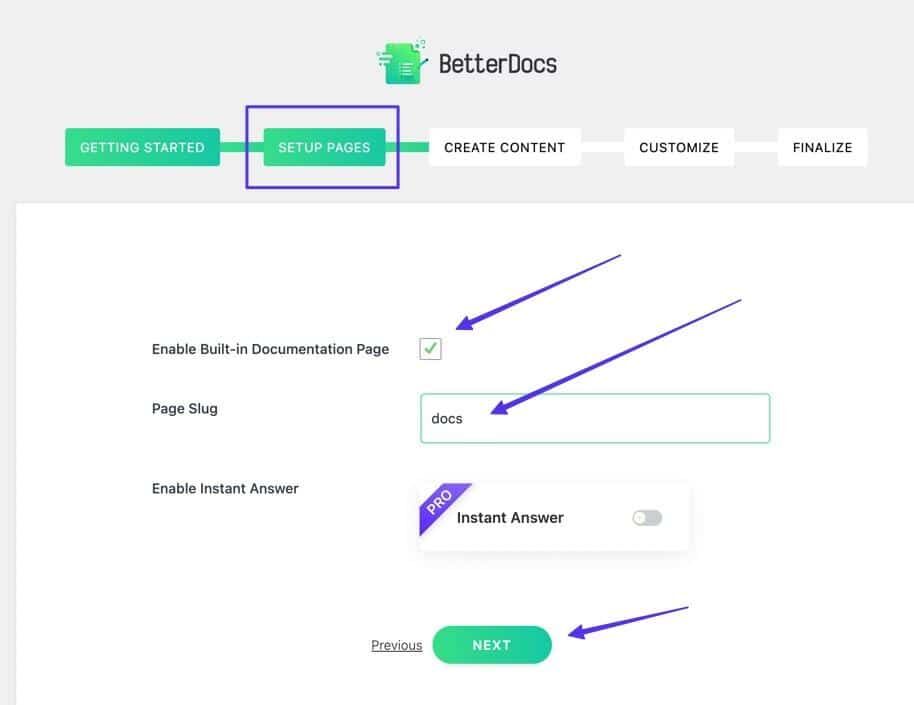
enables the built-in document page
, which adds a home page to your encyclopedia, separate from the home page on your site.
continues to recommend Page Slug, or create your own.
Important you should make sure that the fixed link (under Settings & gt; Permalinks) is set to Post Name to generate built-in document pages.
Click NEXT.
step 3: create documents and categories
WordPress encyclopedia and knowledge base thrive in the process of organizing documents into categories. Therefore, BetterDocs recommends that you create categories and documents to start the process.
first clicks Create Categories.
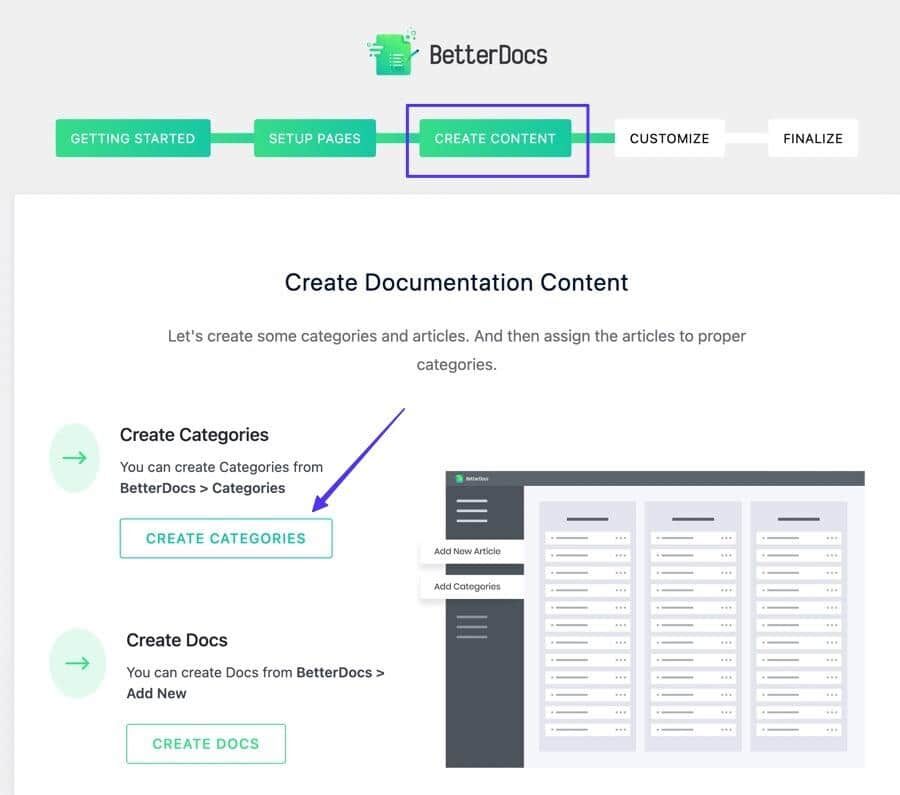
Click create Category
to make many of the categories you need. For each document category, fill in:
- Name
- Slug (or automatically generate Slug with name)
- category icon (optional)
Click the Add New Docs Category button.
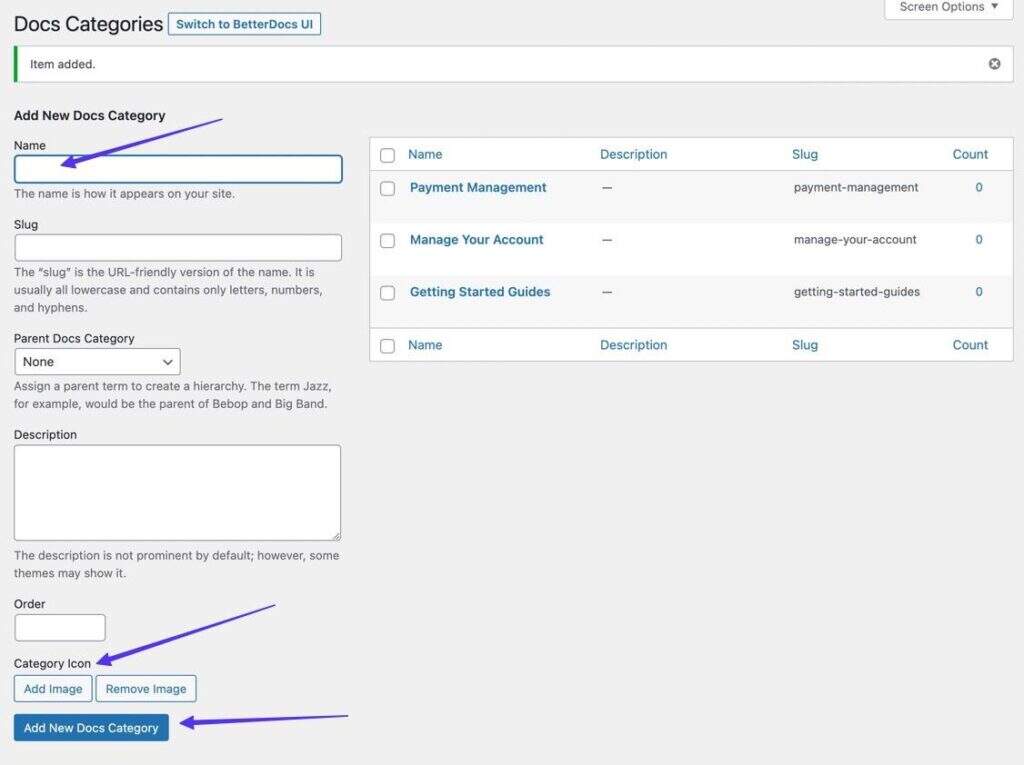
add new document categories
when you add new document categories, you will see them listed on the right. The
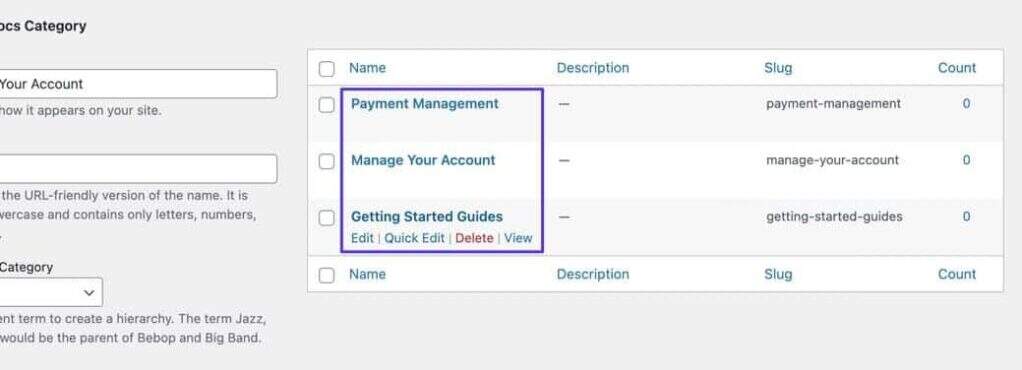
document category list
continues, jumping back to the “Getting Started” page to click the “Create Docs” button.
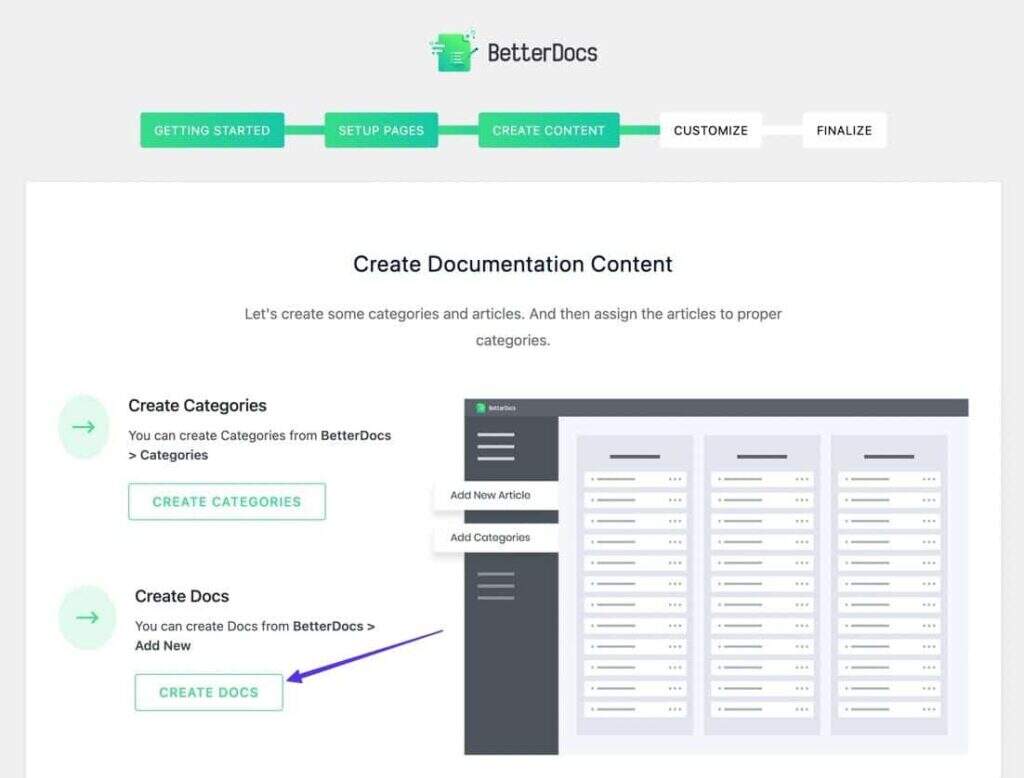
chooses the create document button
. Similarly, you can create as many documents as you want. At least it’s a good idea to get some stuffed content to design the encyclopedia.
be sure to add each document to the appropriate category. Publish document after completion.
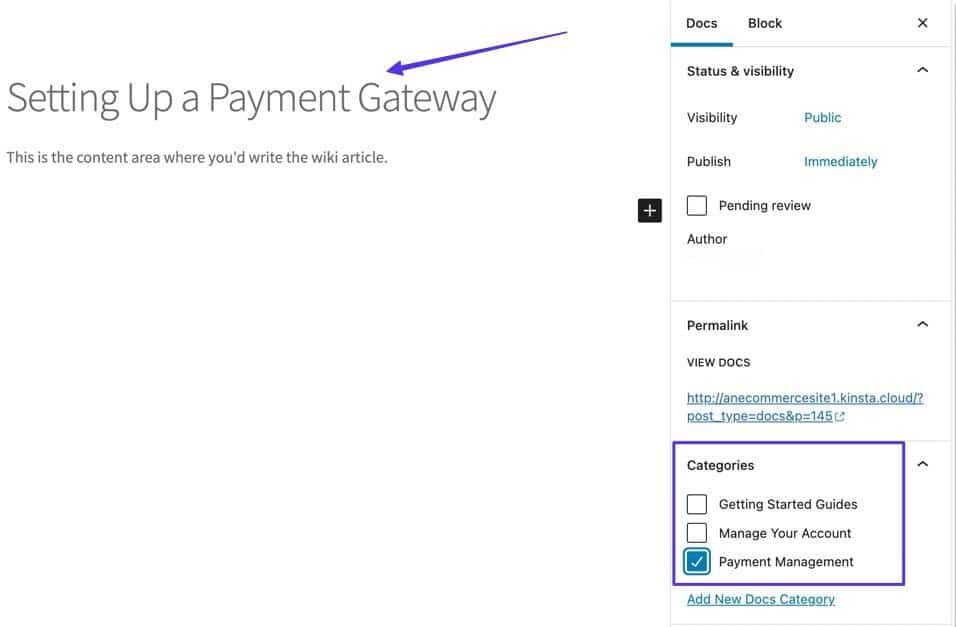
makes the document, adds it to the category, and then publishes the document
step 4: customize the WordPress encyclopedia design
navigation back to the Getting Started guide. Click Next to locate the Customize section. You can add prefabricated designs, custom colors, and administrative settings here.
clicks the Go To Customizer button.
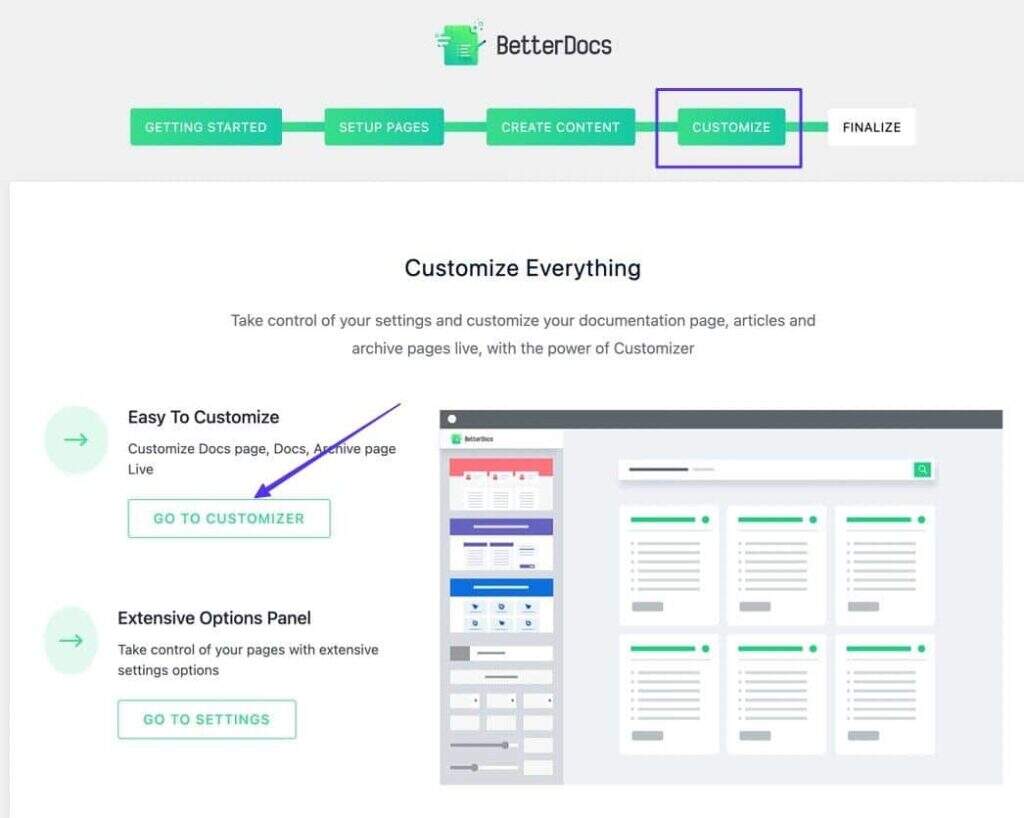
uses the go to Customizer button
, which will take you to WordPress Customizer under the new BetterDocs panel. Here, you can select a prefabricated template, change all design elements, and configure styles for individual documents, sidebars, archive pages, and real-time searches.
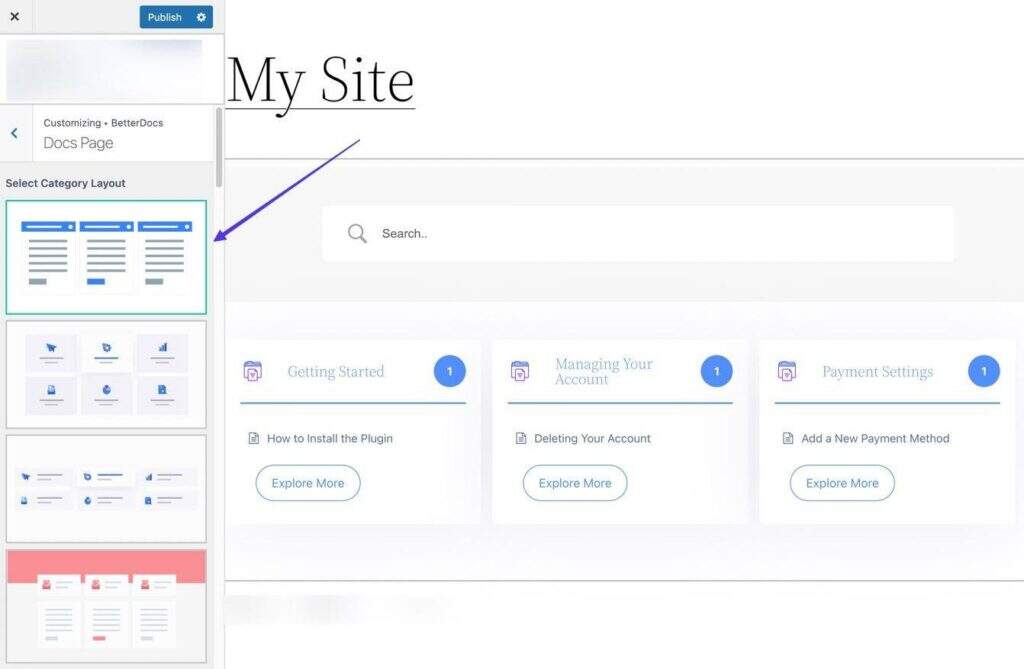
selects the layout and customizes the design of
in WordPress Customizer step 5: complete the encyclopedia and visit your document page
to return to the Getting Started guide and skip to the Finalize section.
clicks the Visit Your Documentation Page button to display the URL and front end of your encyclopedia.
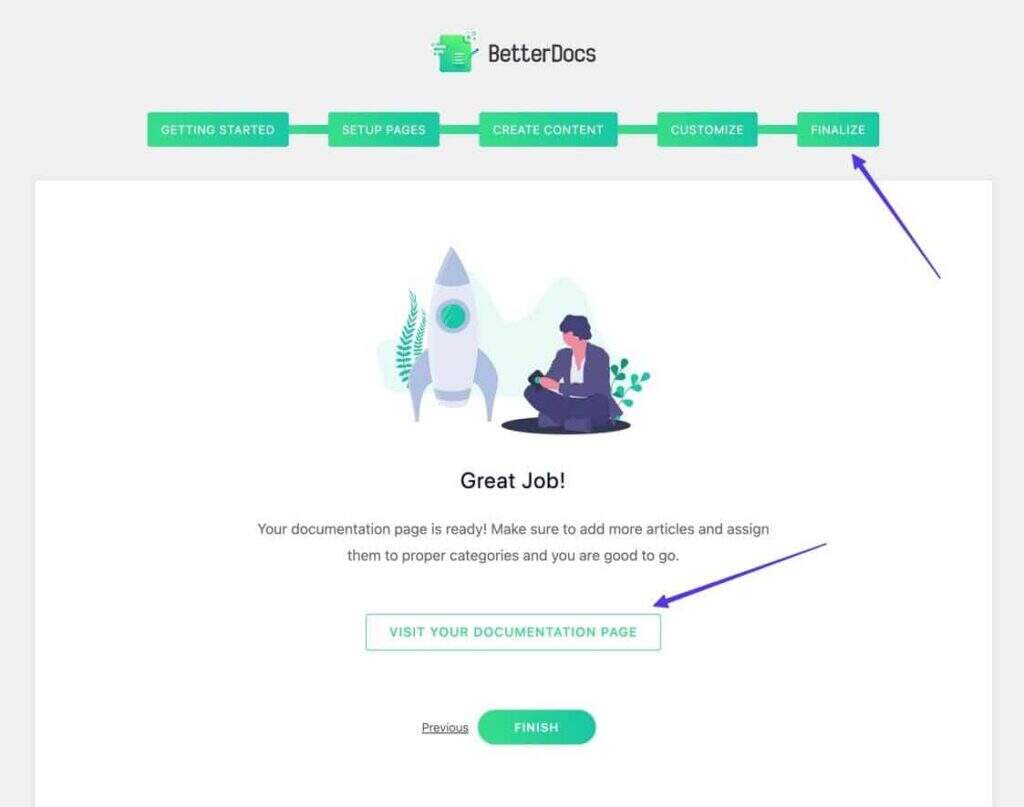
Click to access your document page
welcomes you to click and see what it looks like. Keep in mind that document pages are not stored in WordPress’s Pages list, so you should save URL. The front-end
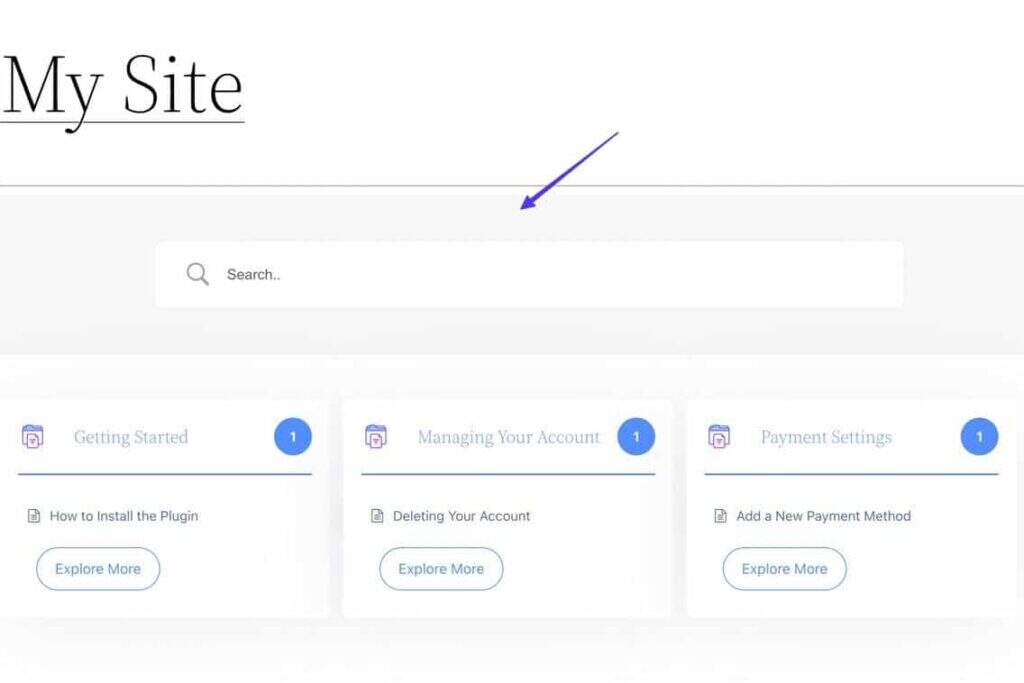
of the
documentation encyclopedia step 6: add the encyclopedia page to your menu
get the document page URL and add it to your main menu, because WordPress may not list it in the Pages section. This way, you can access it at any time.
therefore, copy the URL of the document page. URL
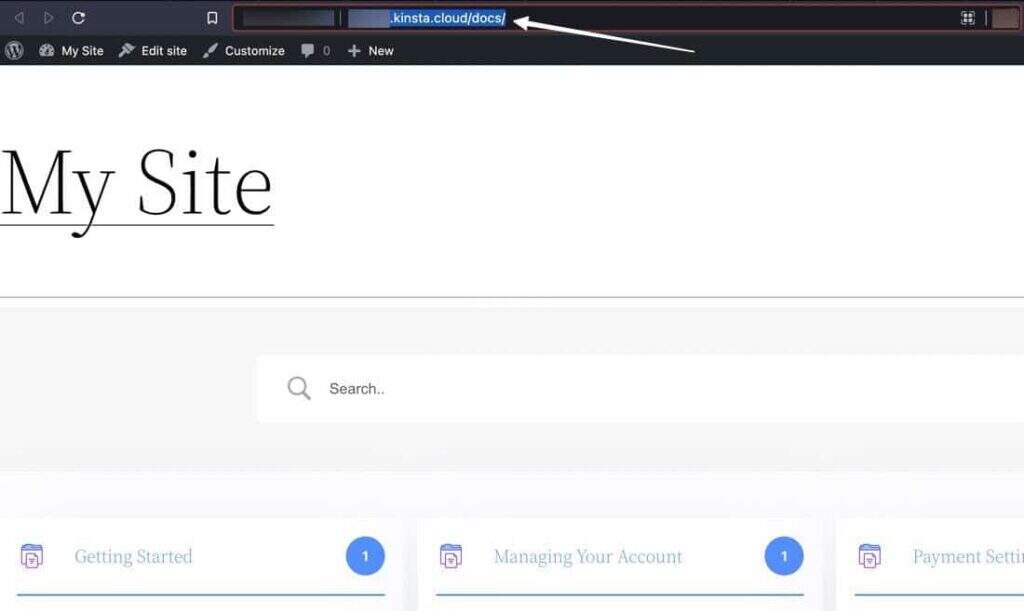
that
copies prefabricated document pages adds it to your menu using the classic Appearance & gt; Customize & gt; Menu method or using a new visual WordPress editor (appearance & gt; editor).
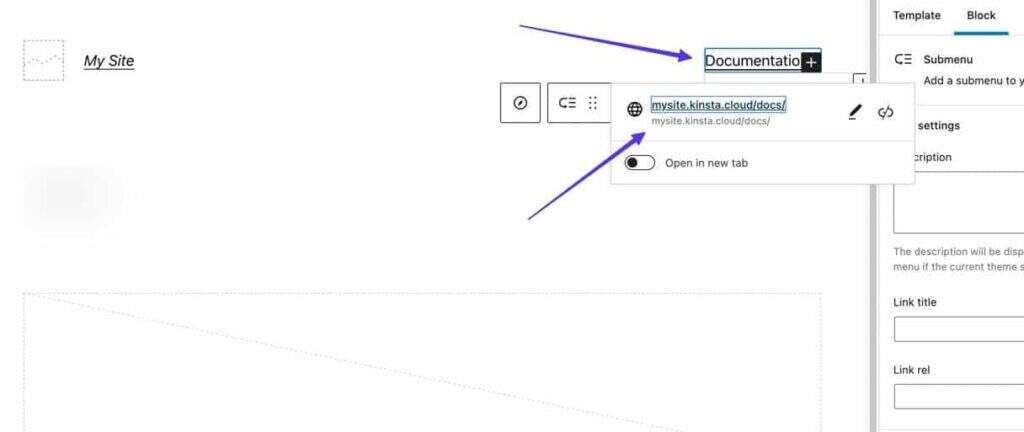
add URL as menu item
step 7: adjust your settings
your encyclopedia / document page is now active. All that’s left is to edit any settings you want to make it more customizable.
to do this, go to BetterDocs & gt; Setting.
this page provides the following options:
- Custom Real-time search
- modify your Design
- change the appearance of a single document
- sets the order of documents and categories
- add column
- use the short code
- to enable instant answer
- …
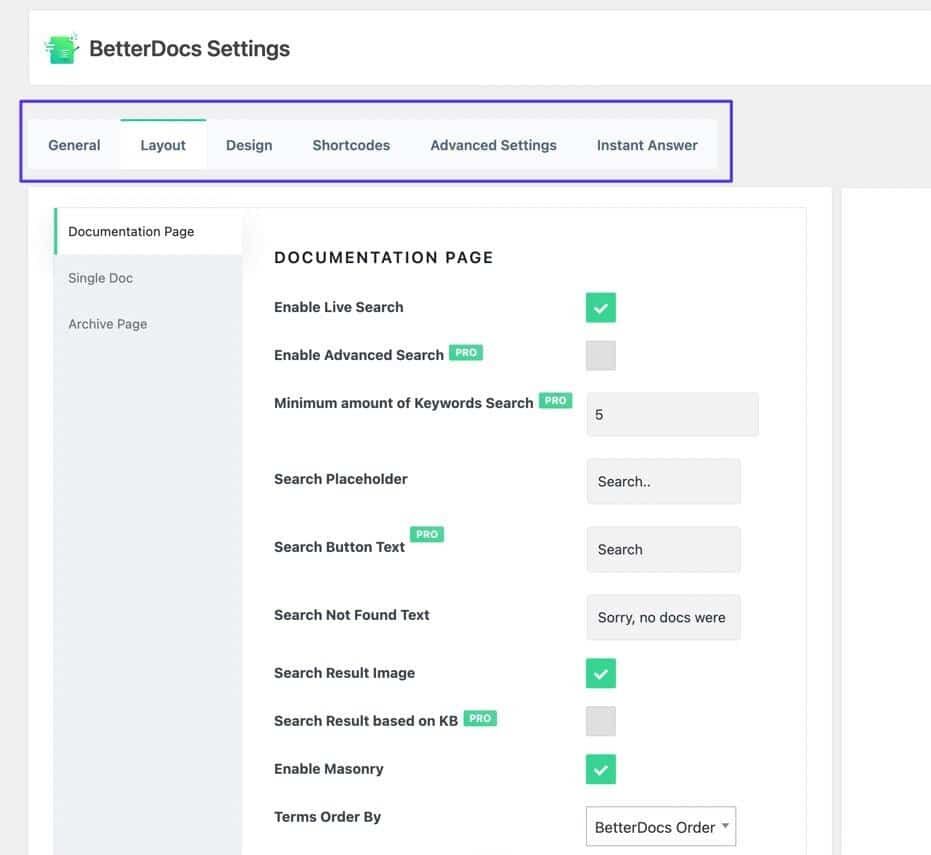
BetterDocs settings panel
only! We encourage you to look at all parts of the WordPress encyclopedia / knowledge base to make sure they all look correct, including individual document pages and search bars. Front view of
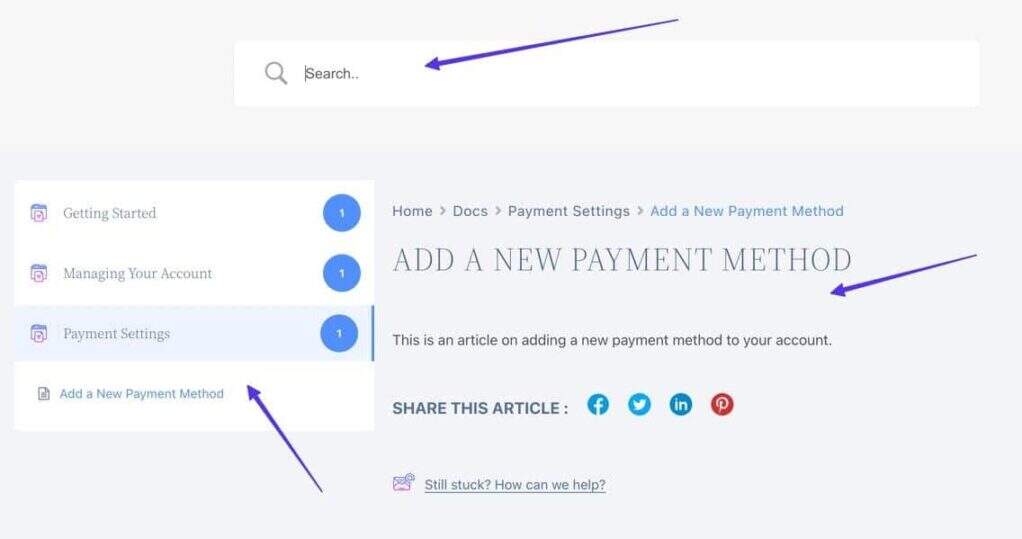
WordPress Encyclopedia
10 Top WordPress Encyclopedia and knowledge Base theme
one way to establish an WordPress encyclopedia is to install the WordPress encyclopedia theme on your WordPress site. When looking for encyclopedic themes, look for themes with respected reviews, basic encyclopedia functions, and designs that suit your brand.
according to our research, here are the best WordPress encyclopedia themes to choose from:
1. KnowHow by HeroThemes
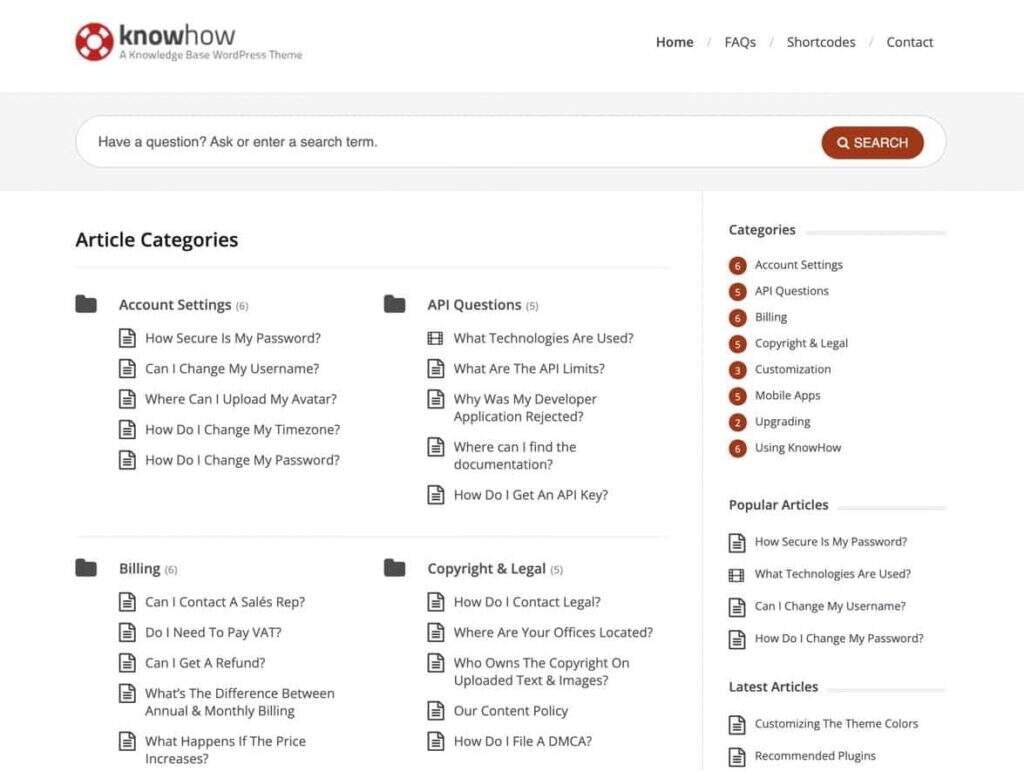
KnowHow by HeroThemes
HeroThemes has created several themes and plug-ins to add knowledge base and encyclopedia features to your WordPress website. KnowHow is one of the most popular options because it allows you to configure a collection of documents / articles, and then set up filtering and search tools for the easiest navigation.
Remarkable features:
The
- AJAX real-time search feature answers questions and search queries immediately.
- includes FAQ pages to supplement your knowledge base / encyclopedia.
- will design a color picker that matches your website.
- supports videos and images in knowledge base articles.
- ‘s unique navigation elements, such as multi-level animation buttons.
- is used to add simple codes for everything from accordions to buttons and flexible columns to toggles. The
2. Flatbase
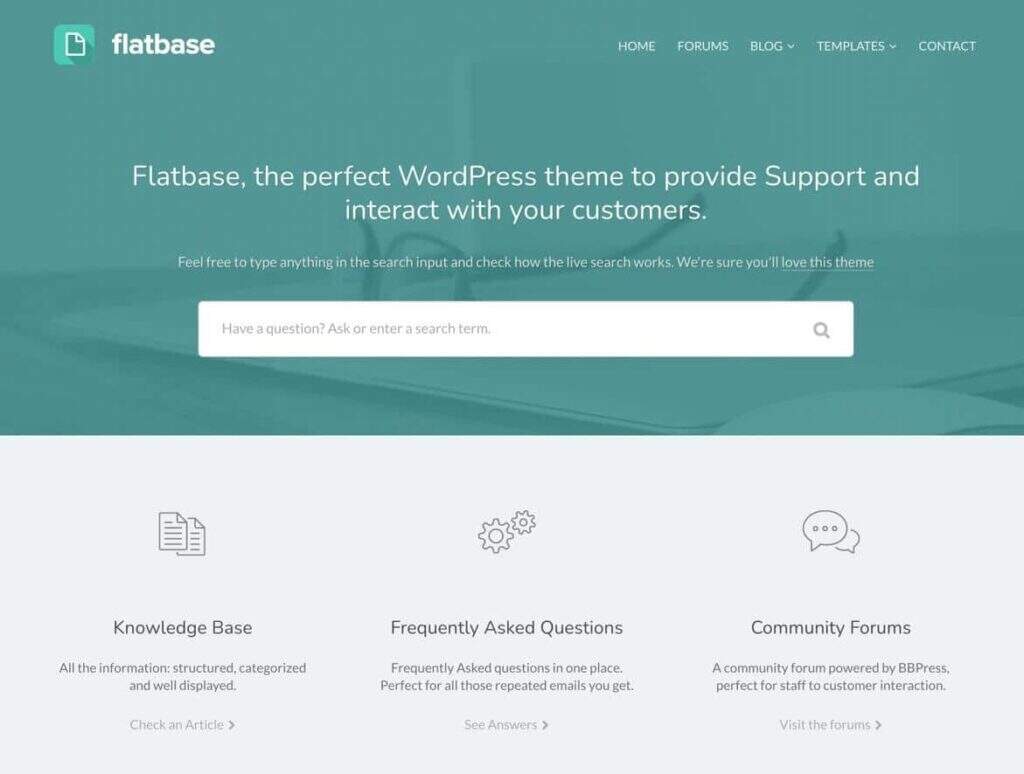
Flatbase wiki topic
Flatbase is an advanced WordPress topic used to create a knowledge base or encyclopedia. One of the main benefits of using Flatbase is that it comes with variants to implement a minimalist, modern, or software-based knowledge base.
anyway, all formats have the ability to add a home page and a search bar. You can then use templates to build galleries, FAQs, and knowledge base pages.
Remarkable features:
A unique design collection of
- presentation content, including modern, classic, mobile applications, help desk, and startup encyclopedia.
- supports multiple article layouts such as sidebars, rich media content, and so on.
- has an AJAX search bar for users to get answers to their questions in real time.
- integrates with bbPress to add forums to your site.
- article feedback tool, so that users can like the content. You can also organize content according to your favorite content.
- uses accordion or list styling FAQ templates.
- has complete typesetting and translation control to achieve the ultimate customization. The
3. Lore
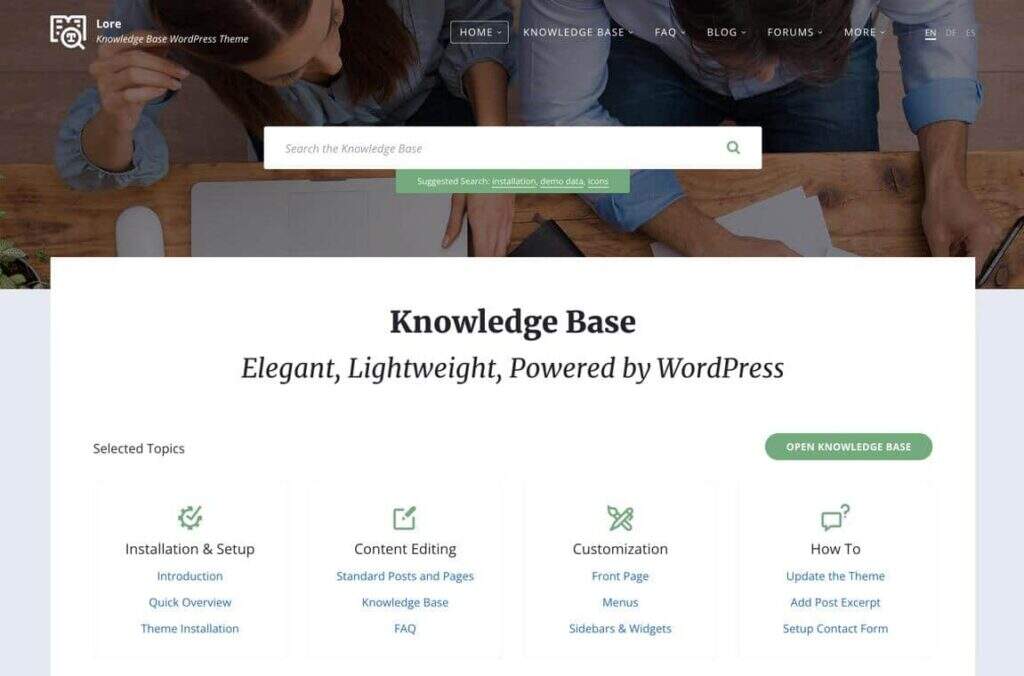
Lore theme
WordPress theme Lore provides an elegant knowledge base design at low cost. Site owners can create knowledge bases, encyclopedias, or FAQ pages and link them to your blog and forum. The overall design is simple and lightweight, with icon support, can well present the content.
Remarkable features:
- is a color scheme tool that quickly creates perfect tones that match your brand.
- combines blogs, FAQs, and knowledge bases to allow you to run all of these from one website. The forum function of
- and bbPress integration.
- is used to load presentations of encyclopedic elements such as links, articles, and media, giving you a head start in design.
- comments and votes can move articles up or down in the encyclopedia depending on their popularity.
- sidebar with filters and drop-down menus.
- breadcrumbs and links to the next / previous article to speed up encyclopedia navigation.
4. MyWiki
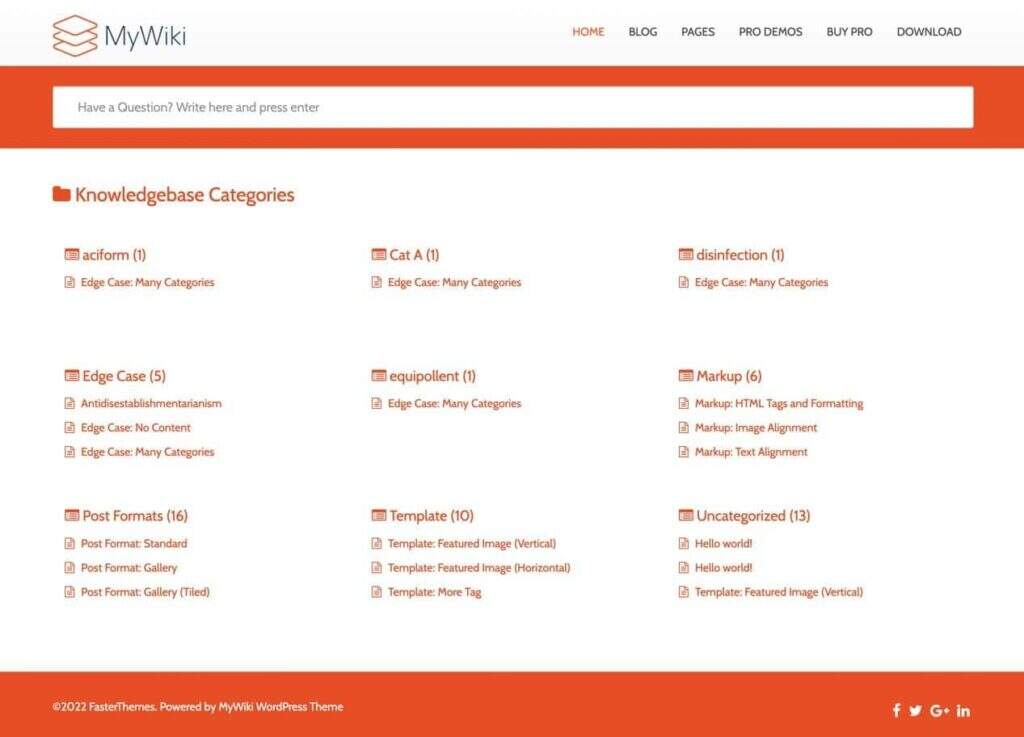
MyWiki topics
MyWiki topics enable users to build wiki or knowledge bases with minimalist design features. It’s as clean as them, and it’s easy to set up on your WordPress site.
also has a quick search area that advises users and uses AJAX. Fully responsive topics include import demos and options to switch colors according to your brand.
Remarkable features:
- is a simple, intuitive home page where users can see all categories and the hot door subcategories below. The AJAX search bar that
- uses to enter questions and display results.
- is used to add the blog section and page of the sidebar.
- has simple footer control with social media links.
- supports a wide range of article elements, such as titles, block quotes, tables, lists, and code snippets. The
5. Knowledge Base by InspiryThemes

knowledge base topic
Knowledge Base is a combination of style and function. Modern design comes with four skins and a wide range of theme options. We like it best to build a technical knowledge base, but changing the design may be good for any industry.
Remarkable features:
- has a large search bar with AJAX control results.
- a compliment counter sends certain articles to the top of the list.
- four colors of skin can improve your brand image.
- six custom gadgets for adding the latest articles, feature articles, supporting documentation, and quick links.
- full-width page templates and options for creating FAQ pages.
- has three home page templates with the option to switch designs using simple codes. The integration of
- and bbPress. Real-time chat function when
- is integrated with the WP Live Chat plug-in. The
6.HelpGuru
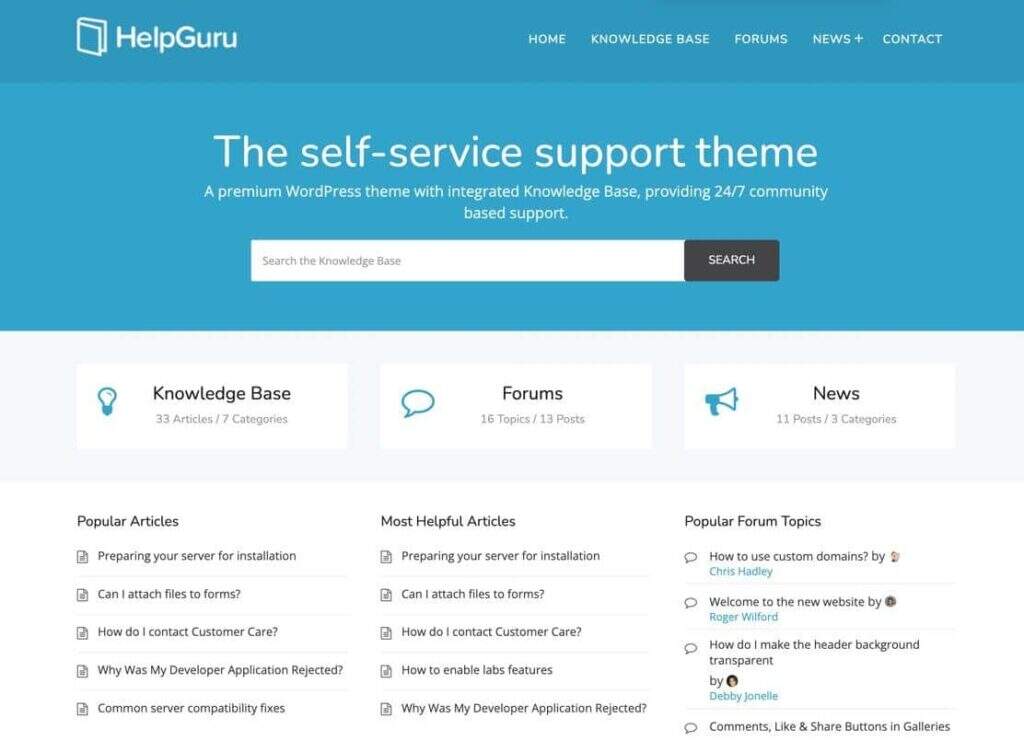
WordPress topic HelpGuru
HelpGuru is an advanced self-help knowledge base topic from HeroThemes that is ideal for creating a centralized space for all customer support resources, including buttons, knowledge bases, forums, and blogs.
also has a complete navigation menu, search bar, list of popular articles, and footer area to display information about your brand, latest news, and social media buttons.
Remarkable features:
- a real-time AJAX search field that provides results to the user in seconds. The feedback tool for all
- articles allows you to collect information about your knowledge base articles and see what needs to be improved. Drag-and-drop sorting of
- content.
- has the option to add downloadable attachments to articles. Three
- gadgets can highlight authors, knowledge base articles, and categories anywhere on your site.
- quickly customizes settings to adjust elements such as colors and logos without messing up the code.
- translation and multilingual support. The
7. Wikilogy

Wikilogy theme
Wikilogy theme enables its users to launch an encyclopedia for storing visual and written information, similar to what you get from an online encyclopedia. The theme has a variety of layouts and is ideal for creating an encyclopedia site on any topic, from movies to technology.
users will receive a visually focused interface that contains large images to articles and background media to be placed behind your search bar.
Remarkable features:
- 8 prefabricated layouts for quick launch of wiki or encyclopedia websites.
- has infinite fields and supports tables of content for images, maps, text, and so on.
- is a special toolbar for adjusting and adding elements such as fonts, social sharing buttons, and comments.
- A content index that accurately outlines what is available in your wiki. It is like a directory with links to guide the user.
- has a category organization tool with unlimited parent-child categories. The integration of
- and WPBakery Page Builder is used to implement drag-and-drop when designing your wiki. The contents of the
- in alphabetical order. List of
- users and authors.
- is used to maintain the membership system of the community behind wiki.
8. UnboundStudio by Knowledgepress
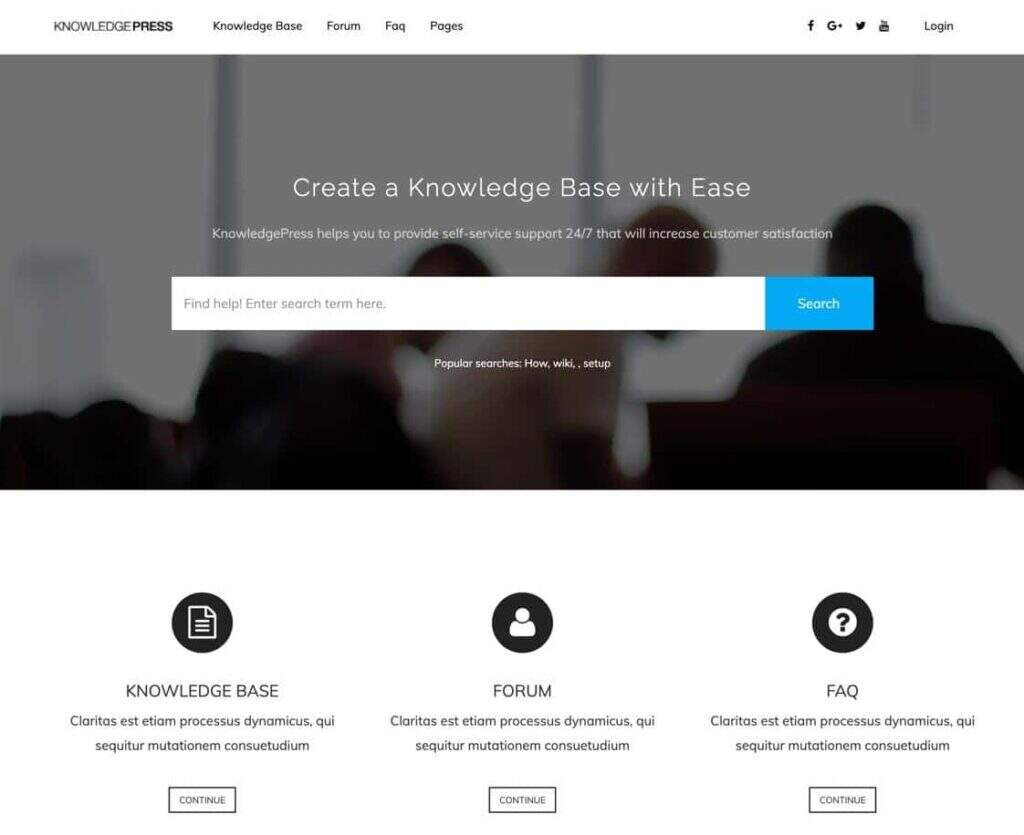
Knowledgepress themes
Knowledgepress topics are sold on ThemeForest for an one-time fee, allowing you to create a knowledge base page that links to tutorials, FAQs, forums, and more. Each part of the
knowledge base is accessible through the search bar, and you can get filters and navigation menus to add links to all pages, social media buttons, and login modules.
this design is quite generic, so you can customize it to suit your brand needs, including options for changing colors, adding logos, and adjusting footers.
Remarkable features:
- visual composers who drag and drop elements when building a knowledge base site.
- categories and articles are reordered to improve content management.
- is a FAQ plug-in with accordion action to integrate questions and answers.
- has a real-time search bar with a variety of functions, such as placeholders, navigation, real-time search gadgets, and search analysis.
- public voting or member voting only, as well as the option to reset the vote count.
- bread crumbs are easy to navigate.
- is used to add a variety of custom settings for logos, site icons, borders, and custom CSS.
- gadgets for real-time search, recent articles, and lists of popular content based on views, votes, or comments.
- is a page template for voting, related articles, social sharing, directories, etc. The
9. IKnow
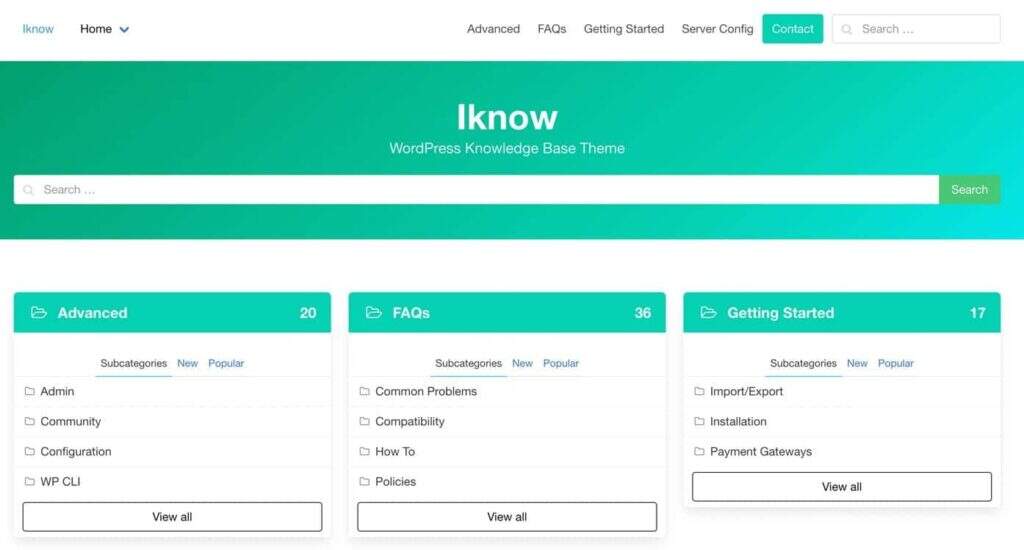
WordPress topic IKnow
IKnow is a free theme with minimalist design that is used to create a knowledge base for all types of enterprises. You will get a standard site menu, an area to add logos, and a title section for merging messages with customers and containing the search bar.
in addition, this topic provides organized categories that contain links to articles and a count of how many articles are in each section.
Remarkable features:
- is used to make settings for wiki, FAQ, Helpdesk, or knowledge base.
- is used to add custom icons to each category module.
- is used to organize the tags and categories of article collections.
- users vote for or against the article rating system.
- bread crumbs and top bar menu for quick navigation.
- is a custom gadget that displays the current navigation of a category anywhere on your site.
10. MyKnowledgebase
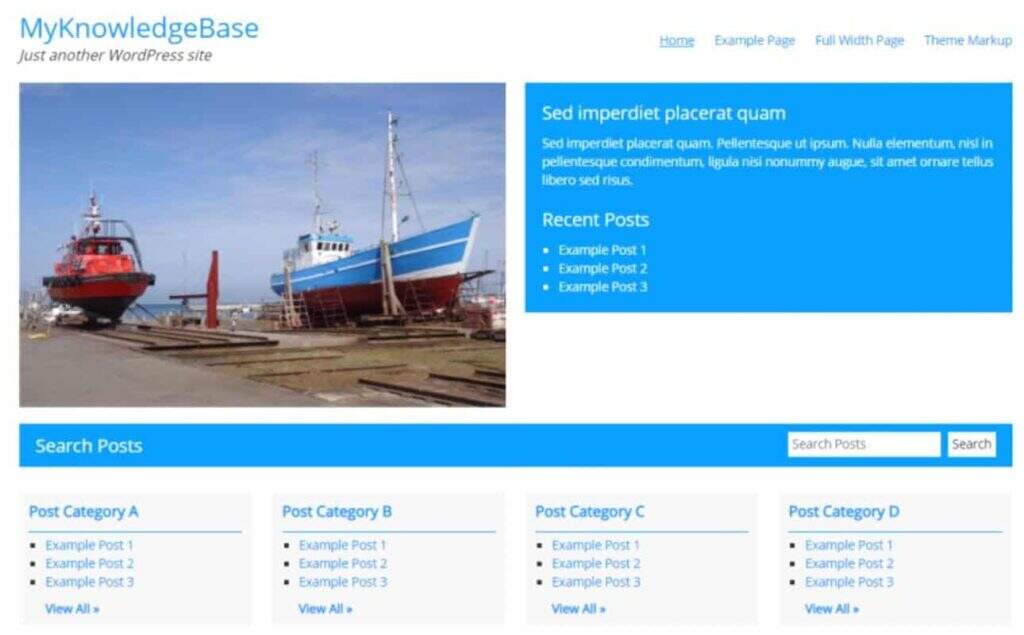
MyKnowledgebase theme
you can download the MyKnowledgebase theme for free and install it to create an WordPress encyclopedia, knowledge base, or library website.
this is a lightweight solution with quick color customization and custom article / page templates. We particularly like FAQ page templates, especially when we have both FAQ and a knowledge base on a site.
Remarkable features:
- a complete navigation menu for linking to multiple pages on your site. The organization category on the
- home page.
- color customization.
- a fast, non-intrusive search bar.
- a list of all articles in each category.
- has a welcome module with gadgets to explain the site and display a list of recent articles.
- images support uploading welcome banners.
- custom background and title. The
- footer gadget and columns are used to provide more navigation and sticky content throughout the site. The
10 Top WordPress Encyclopedia and knowledge Base plug-in
choosing a theme to run your WordPress encyclopedia or knowledge base means that you must create a completely new WordPress site or change the current theme.
if you are building a completely new site, that’s fine, but in some cases, you have no reason or don’t want to get rid of the current theme.
in this case, your best option is to install an WordPress encyclopedia plug-in that maintains the current theme design but adds encyclopedia and knowledge base functions to your site. There are plenty of WordPress encyclopedia plug-ins in
, but here are the best: the
1. BetterDocs

BetterDocs plug-in
BetterDocs plug-in is one of the best WordPress encyclopedia plug-ins for a number of reasons. First of all, the plug-in has a quick setup process and rich documentation in case you have any questions.
developers are very active, and you can find answers to your questions in the forums. In addition, the plug-in immediately activates the knowledge base area on your website, and you can choose from multiple presentation designs to match your brand.
Remarkable features:
- is used to generate a prefabricated template design for the login page to guide users to all documents. Set up archives and single-page documents with a single click.
- directory option. The
- short code and page builder eliminate the need to use code. Real-time search function for
- real-time search results.
- is used for the grid view and advanced list view of the document.
- is a tool that manages multiple repositories from one plug-in.
- is used to grant role control to specific access to documents and edits.
- integrates analysis to understand how to use the encyclopedia / knowledge base.
- is used for various WordPress blocks of category grids, category boxes, and search forms. The
2. WordPress Knowledge Base by HeroThemes
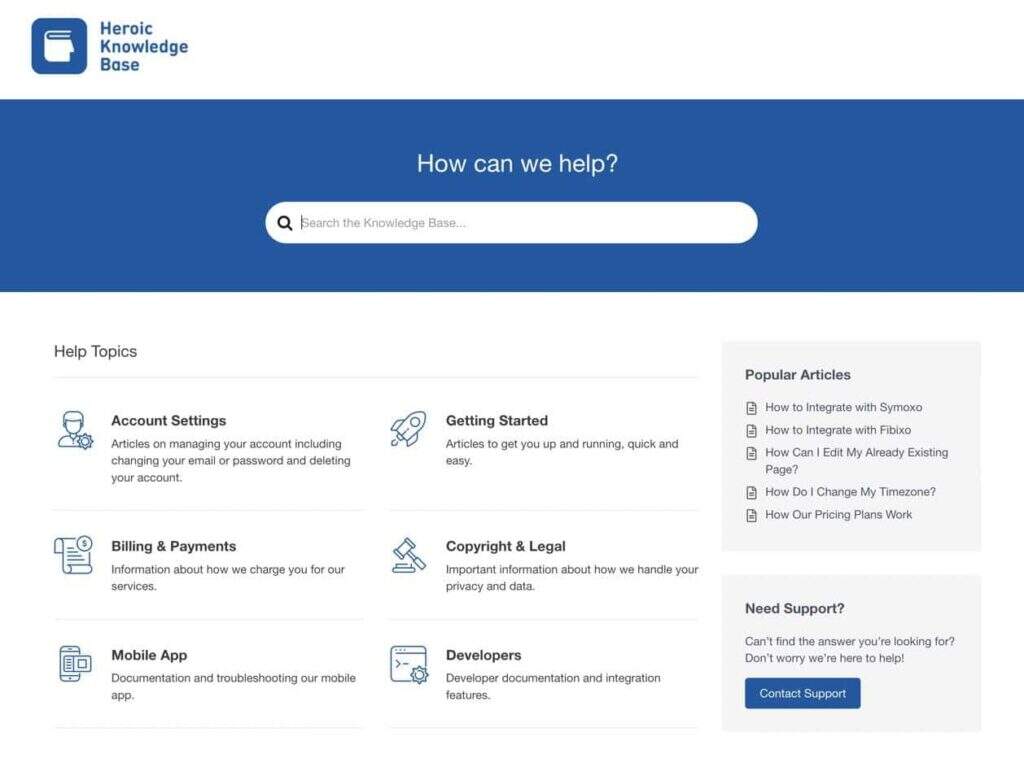
WordPress knowledge base plug-in
WordPress Knowledge Base by HeroThemes is provided as a simple package for including WordPress encyclopedias or knowledge bases on existing websites. The plug-in provides a beautifully designed and modern interface with a search bar, topic organization, and sidebar navigation. The
result is an intelligent knowledge base that accepts user feedback, provides analysis, and brings together countless navigation elements for intuitive browsing.
Remarkable features:
- does not need coding to create beautiful articles.
- customizes each piece of content and can organize them into categories using icons and quick links.
- has a search bar with instant answers related to the keywords you type.
- contains an analysis of information about the total search, failed search, and search effectiveness of the knowledge base.
- user feedback button to tell you whether the article is useful or not.
- has a chat box help assistant that pops up in the corner and recommends certain articles based on the area of the site.
- demonstrations of various use cases, such as product help, technical documentation, online user guides, and internal knowledge bases.
- article attachments and built-in directories. The
3. Knowledge Base by UnboundStudio

UnboundStudio Knowledgebase plug-in
UnboundStudio Knowledgebase plug-in provides three demonstrations with a choice of boxed and list layouts, as well as multi-column or single-column designs.
you can also choose between different colors to create a stylish, modern knowledge base with categories and links to all articles in your library.
Remarkable features:
- is a drag-and-drop tool for reordering articles and categories. Custom slug and bread crumbs used by
- to improve navigation. Attachment to the
- article file. Several blocks in the
- WordPress Block Editor.
- uses placeholders, hidden buttons, placement tools, and options to disable real-time search completely for real-time search.
- has the main knowledge base page with page content, columns, sidebar, and icon settings.
- is used in the voting system for the public or members to vote on articles, as well as the ability to set voting icons and reset or disable voting.
- is a gadget that displays a list of categories and articles anywhere in the WordPress encyclopedia.
- article list short code. The
4. Yada Wiki

Yada Wiki plug-in
Yada Wiki is a free plug-in with WordPress encyclopedia article types and settings that can add special tags and categories to the encyclopedia. Most plug-ins are used with the standard WordPress editor to make it intuitive to all WordPress users, especially those who prefer to use short codes.
Remarkable features:
- is an encyclopedia page creator and tool for linking all of these pages into one encyclopedia.
- two simple codes used to place encyclopedia buttons anywhere on your site.
- adds encyclopedia elements to any page or article button on the site.
- catalog generator with style elements.
- encyclopedia category simple code.
- is an index output tool used to render a grid of articles similar to tables.
- is used for the sidebar gadget of the table of contents and a list of all articles (or articles under a category).
5. Knowledge Base by Echo Plugins

Knowledge Base by Echo Plugins
Knowledge Base, from Echo Plugins, provides presentation layouts that allow you to start working on an WordPress encyclopedia or knowledge base in seconds.
you can also match styles to your current theme without touching any code. There is an advanced version, but basic features, such as search bars and hierarchical documents, are free.
Remarkable features:
- is used to quickly build demonstration templates and simple codes for encyclopedias. A directory automatically generated by
- .
- navigation elements, such as back buttons, breadcrumbs, comments, and tags.
- lists several ordering tools for articles. The hierarchical organization of
- documents, with five levels.
- organizes documents by service, product, or team.
- 26 professionally designed templates and settings for layouts, colors, and tabs.
- integrates with some of the most popular page builders on the market, such as Elementor and Beaver Builder.
- various advanced plug-ins for permissions, private articles, sidebar and article import functions. The
6.BasePress

BasePress plug-in
CodeSavory’s BasePress is a useful plug-in for developing documentation sites such as encyclopedias and knowledge bases. It is an ideal solution for a customer support center on any website to see how you set up your brand, organize your content, and leverage templates, all without touching a single line of code.
Remarkable features:
- manages unlimited knowledge bases from a dashboard.
- is organized by department, service, product, or any group of articles you want. The target answer of the
- user after entering the content in the search bar.
- maintains a similar look and feel to what is already on your site.
- comes with a search bar and a prefabricated entry / login page for the most popular articles to help users get started.
- ‘s unlimited hierarchy, sections, descriptions, and icons.
- short code support. Gadgets for the
- section and knowledge base.
- drag and drop reorder. The
7. weDocs

weDocs plug-in
weDocs plug-in provides a free WordPress encyclopedia generator for beautifully organizing all knowledge base documents. All documents are hosted on WordPress, and you can create an unlimited number of articles, each with a category and order. The
weDocs plug-in displays your encyclopedia on a separate page and fits perfectly with the current design of the site.
Remarkable features:
- quickly creates documents in the WordPress dashboard while using a standard WordPress editor.
- drag-and-drop reorder, and buttons for deleting, previewing, and creating articles.
- uses an intuitive organization of categories on the back-end and front-end interfaces.
- a tagging system. The document search gadget that
- wants to add to any sidebar, footer, or custom gadget area. The
- filtering tool searches only specific parts of the knowledge base. The same is true of
- getting external documents. The
8. MinervaKB
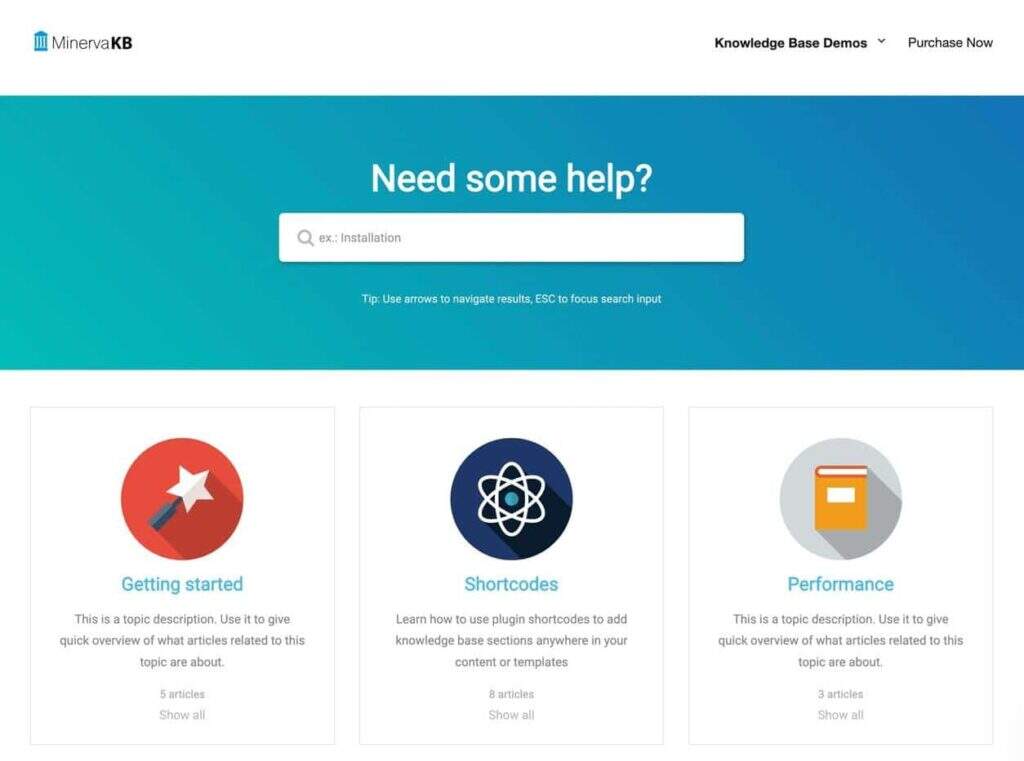
MinervaKB plug-in
MinervaKB is an advanced plug-in with a wide range of options for providing support tickets and real-time search capabilities on existing sites. The
WordPress encyclopedia / knowledge base plug-in is ready to be used with the short code generator and article feedback settings. You can also restrict the content or open it to the general public.
Remarkable features:
- searches for answers to user questions in real time in seconds.
- a variety of skins to match your website and design something unique.
- article tags and categories appear in search results to better understand each article.
- has more than 500 smart settings, ranging from how the scoring system works to the way search results are displayed.
- integrates with popular plug-ins such as WPBakery, Elementor, and Google Analytics.
- access restrictions, where you can display a trailer for the content or block it completely. The FAQ section built into
- . A directory quickly generated by
- .
- likes and dislikes buttons for all articles-as well as the ability to turn it off.
- supports running multiple WordPress encyclopedias at the same time. The
9. WP Glossary
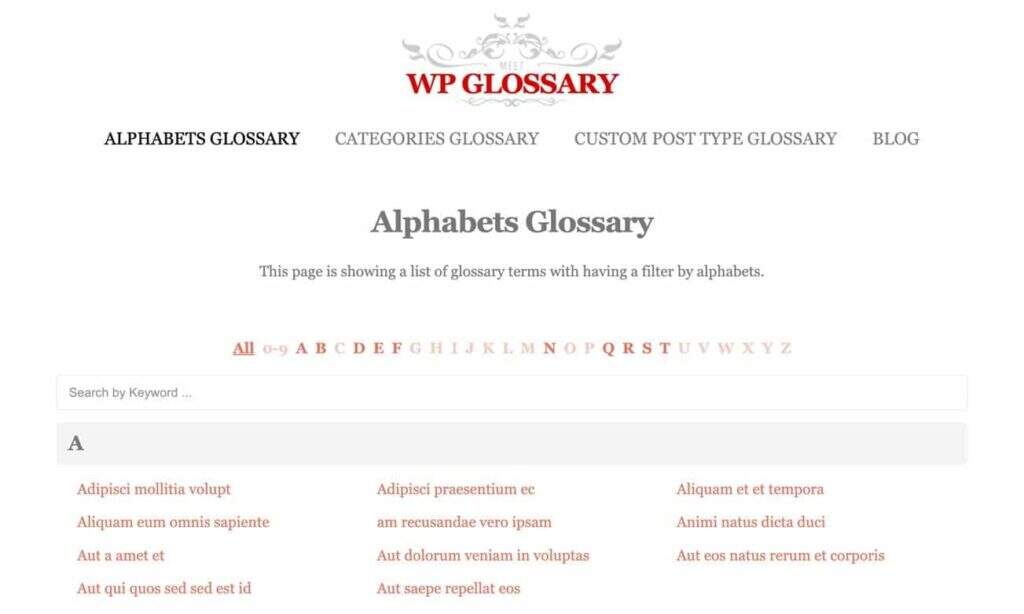
WP Glossary plug-in
WP Glossary plugin is an advanced option that provides a unique view of the WordPress encyclopedia. In essence, you can create a vocabulary or dictionary to compile your list of documents so that it is very similar to an encyclopedia, but in a slightly different format. The
encyclopedia displays articles on its home page, with the alphabet menu at the top. There is also a search bar, as you can see in the traditional WordPress encyclopedia.
Remarkable features:
- enhanced search function, plug-ins automatically link highlighted phrases back to relevant content.
- supports unlimited articles and terminology.
- an instant search that displays the results as the user types.
- has an advanced short code with the option to display encyclopedia articles anywhere. You can configure settings in short code to adjust the title, layout, and taxonomy.
- is used to edit custom styles for everything from buttons to colors and article titles.
- custom CSS support. The
10. Very Simple Knowledge Base

Very Simple Knowledge Base plug-in
is considered one of the more lightweight plug-ins for creating WordPress encyclopedias or knowledge bases, and the Very Simple Knowledge Base plug-in has quick code for displaying articles and categories.
comes with a basic design that can be mixed with any current brand. You can organize articles by categories and display a list of these categories on the encyclopedia home page.
Remarkable features:
Settings for
- columns, categories, and sorting.
- has simple codes for a variety of settings, such as options for displaying only certain categories, tags, or articles.
- has gadgets for per-page articles and hidden article properties.
- article tags and custom article types.
Summary
in this article, you learned how the WordPress encyclopedia can be used to store large amounts of information for specific purposes, while also allowing users to access that information in an organized manner. It is also important to remember that knowledge bases are just different types of encyclopedias and are often used to organize content for users who need to know about products or services, similar to online user manuals.
We also discussed the benefits of adding WordPress encyclopedias to your site, such as how cheap, easy to maintain, and simpler choices for organizing content compared to online storage services, e-mail chains, forums, and even blogs.
in general, we recommend that you take advantage of these benefits and seriously consider whether encyclopedia can improve your online image. When conducting research, it is also wise to remember the main elements that make up the encyclopedia.

